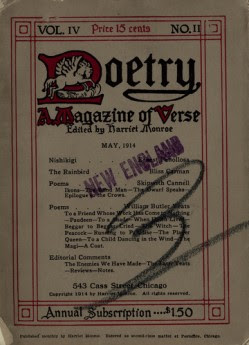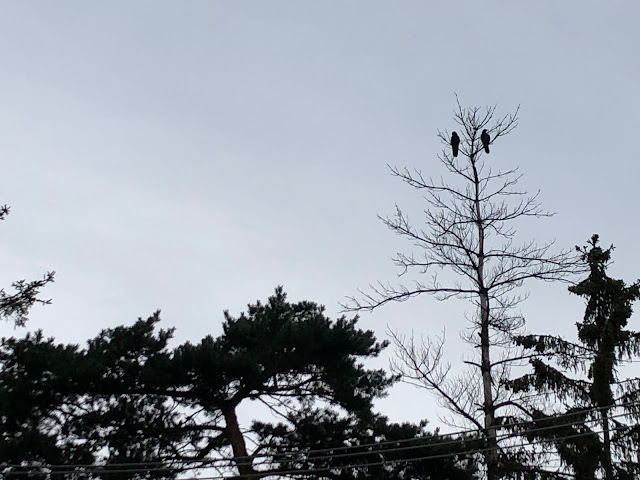"Now all the truth is out," William Butler Yeats writes. "Be secret and take defeat/From any brazen throat."
The beginning of an odd little 1916 poem with a breathtaking title: "To a Friend Whose Work has Come to Nothing."
The beginning of an odd little 1916 poem with a breathtaking title: "To a Friend Whose Work has Come to Nothing."
Easy for Yeats to say, who straddled the world in his own lifetime, and would linger longer than most. Whose lines are used as movie titles: "That is no country for old men..."
In the poem, he seems to brace his unnamed friend, "Bred to a harder thing than triumph," presenting his own success as somehow unfair.
In the poem, he seems to brace his unnamed friend, "Bred to a harder thing than triumph," presenting his own success as somehow unfair.
Being honor bred, with oneIt might seem odd that Yeats might cast himself as a liar, but it's a theme he would return to, such as in an even shorter 1916 poem, "The Coming of Wisdom with Time." This is the whole poem:
Who, were it proved he lies,
Were neither shamed in his own
Nor in his neighbor's eyes?
I swayed my leaves and flowers in the sun;
Now I may wither into the truth.For how can you competeThough leave are many, the root is one;Through all the lying days of my youth.
It's unclear whether it's himself or the days of youth that are lying; my bet is both. Either way, withering into the truth sounds painful. Though not without advantages. The life work of most people either comes to nothing or very close, on the grand scale, and whatever impact anybody manages merely holds back obscurity for the briefest time.
This is a long way of saying, I had mixed feelings when my colleague Eric Zorn returned to the John Kass well for a definitive drink, "The truth about John Kass’ dispute with the Tribune and the Tribune Guild." He begins well, promising he will "summarize the controversy," though I don't believe any piece of writing nearing 5,000 words can be considered a summary unless it's addressing the history of the world.
While I'm confident that Eric has certainly stylishly and thoroughly retired the topic, I hope, if not buried it in a lead-lined coffin, I was still tempted to pick up the theme he began, like one jazz musician riffing on another's melody, and expand upon it, as we did to so much fun and effect earlier last month.
That post got 20 times the average readership, so obviously people, for whatever reasons, are primed to laugh at John Kass. Unlike Yeats's friend, splashing around in the kiddie pool of untruth does not shame Kass in his own eyes, apparently, though it does him in a negative light with certain others.
But my heart isn't in it. Nobody is entirely bad. I have a colleague who tells a story about Kass. She was in the City Hall Press Room when some disturbed person, upset over something she wrote, burst in, shouting, and made to attack her. But Kass leapt across a desk and tackled the man. He saved her.
 |
| "To a friend..." first appeared in the May, 1914 issue of Poetry Magazine. |
Does a moment's physical courage counterbalance years of caustic fuckery? Hard to say. Remember, the people he writes for are already debased, soul-dead Trumpies, lost, looking for their daily fix of fear and self-victimization. If Kass didn't sell it to them, someone else would. It isn't as if, were he unavailable, they'd start reading David Hume instead.
Bigotry is the collision of ignorance and fear. As much as the hostility and damage caused by haters tempts the clear-eyed to simply hate them back, we have to consider the keyhole view of life they limit themselves to, all they miss, the essential tragedy of their condition. They can't listen and they can't learn and so they wander, dazed survivors after an accident, in the sunlit center of a glorious world, eyes squinched shut, lashing blindly out at their imagined enemies. They're hurt and hopeless and you can't scorn them, for long. Or shouldn't, anyway.
So as much as I enjoy heartily ridicule, I tend to eventually come out the other side, shaking contempt off like a dog after a bath. I grew to genuinely pity Jay Mariotti, and wish I had been nicer to him, wondering whether he might not be genuinely ... well, he's a litigious cuss, so I'd better not say. Afflicted with problems more severe than just being an asshole.
Even Bob Greene. I don't regret a bit of BobWatch. Fun, and well-deserved, at the time. But should he pitch forward today into the sand at Sunset Bay, metal detector pinging plaintively beside him, unheard, I don't think I'd use the opportunity to revisit his shameful exit or the deeply weird nostalgic rathole he plunged down. He did hang with Michael Jordan — I certainly didn't hang with Michael Jordan — and had a column in Esquire, and a regular gig on "Nightline," and rang the journalism bell far more loudly than I ever will. That he could vanish so completely is a reminder of just how completely we all vanish, good bad and indifferent. That's the lesson. The warning.
"Be secret and exult" Yeats ends his poem. "Because of all things known/That is most difficult."
Or so imagines Yeats, who won the Nobel Prize in Literature. As so often happens with those simply guessing at life, based on themselves, he's quite wrong. It's not difficult at all. In fact, it's easy. Almost mandatory. What other choice is there? "Soul clap its hands and sing," as Yeats himself instructs in "Sailing to Byzantium." Now there's a plan.










